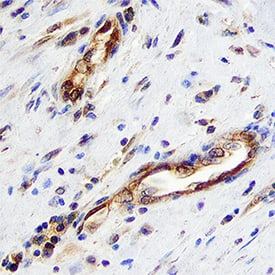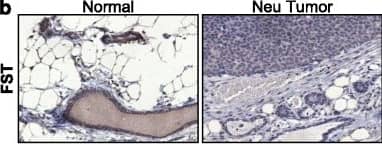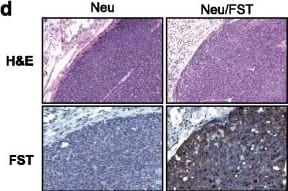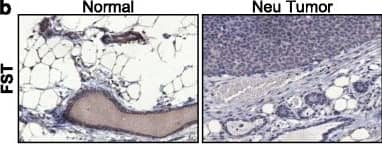Human/Mouse Follistatin Antibody
R&D Systems, part of Bio-Techne | Catalog # AF669


Key Product Details
Species Reactivity
Validated:
Human, Mouse
Cited:
Human, Mouse, Rat
Applications
Validated:
Immunohistochemistry, Neutralization, Western Blot
Cited:
Bioassay, ELISA Development, Immuno-PCR, Immunohistochemistry, Immunohistochemistry-Frozen, Immunohistochemistry-Paraffin, Neutralization, Simple Western, Western Blot
Label
Unconjugated
Antibody Source
Polyclonal Goat IgG
Product Specifications
Immunogen
S. frugiperda insect ovarian cell line Sf 21-derived recombinant human (rh) Follistatin
Gly30-Asp329
Accession # P19883
Gly30-Asp329
Accession # P19883
Specificity
Detects human and mouse Follistatin in direct ELISAs and Western blots.
Clonality
Polyclonal
Host
Goat
Isotype
IgG
Endotoxin Level
<0.10 EU per 1 μg of the antibody by the LAL method.
Scientific Data Images for Human/Mouse Follistatin Antibody
Follistatin Inhibition of Activin A-induced Hemo-globin Expression and Neutralization by Human Follistatin Antibody.
Recombinant Human Follistatin 300 (Catalog # 669-FO) inhibits Recombinant Human/Mouse/Rat Activin A (Catalog # 338-AC) induced hemoglobin expression in the K562 human chronic myelogenous leukemia cell line in a dose-dependent manner (orange line), as measured by psuedoperoxidase activity. Inhibition of Recombinant Human/Mouse/Rat Activin A (7.5 ng/mL) activity elicited by Recombinant Human Follistatin 300 (0.4 µg/mL) is neutralized (green line) by increasing concentrations of Goat Anti-Human/Mouse Follistatin Antigen Affinity-purified Polyclonal Antibody (Catalog # AF669). At 6 µg/mL, this antibody will neutralize > 60% of rhFollistatin 300 bioactivity.Follistatin in Human Breast.
Follistatin was detected in immersion fixed paraffin-embedded sections of human breast using Goat Anti-Human/Mouse Follistatin Antigen Affinity-purified Polyclonal Antibody (Catalog # AF669) at 10 µg/mL overnight at 4 °C. Tissue was stained using the Anti-Goat HRP-DAB Cell & Tissue Staining Kit (brown; Catalog # CTS008) and counterstained with hematoxylin (blue). Specific staining was localized to epithelial cells. View our protocol for Chromogenic IHC Staining of Paraffin-embedded Tissue Sections.Detection of Mouse Follistatin by Immunohistochemistry
Follistatin (FST) expression is repressed in mouse mammary tumors and is restored using an Fst-expressing transgene. a Endogenous Fst expression in normal mouse mammary glands compared with human epidermal growth factor receptor 2, receptor tyrosine protein kinase erbB-2, proto-oncogene Neu (Her2/Neu)-induced mammary tumors (*p < 0.05). b Immunohistochemical analysis of endogenous FST expression in mouse mammary epithelia and tumors. cFst expression in Neu (single) and Neu/FST (bitransgenic) tumors. Fst messenger RNA expression was assessed by quantitative reverse transcription-polymerase chain reaction (**p < 0.01). d Hematoxylin and eosin (H&E)-stained mammary tumors from Neu (single) and Neu/FST (bitransgenic) mice are shown in the upper two panels. Immunohistochemistry for total (endogenous and transgenic) FST expression in lower two panels in single (left) and bitransgenic (right) tumors. Image collected and cropped by CiteAb from the following open publication (https://pubmed.ncbi.nlm.nih.gov/28583174), licensed under a CC-BY license. Not internally tested by R&D Systems.Applications for Human/Mouse Follistatin Antibody
Application
Recommended Usage
Immunohistochemistry
5-15 µg/mL
Sample: Immersion fixed paraffin-embedded sections of human placenta and human breast
Sample: Immersion fixed paraffin-embedded sections of human placenta and human breast
Western Blot
0.1 µg/mL
Sample: Recombinant Human (rh) Follistatin 300 aa 30-329 (Catalog # 669-FO)
Sample: Recombinant Human (rh) Follistatin 300 aa 30-329 (Catalog # 669-FO)
Neutralization
Measured by its ability to neutralize Follistatin inhibition of Activin A-dependent hemoglobin expression in the K562 human chronic myelogenous leukemia cell line. At 6 μg/mL, this antibody will neutralize >60% of rhFollistatin 300 bioactivity on K562 cells.
Reviewed Applications
Read 1 review rated 5 using AF669 in the following applications:
Formulation, Preparation, and Storage
Purification
Antigen Affinity-purified
Reconstitution
Reconstitute at 0.2 mg/mL in sterile PBS. For liquid material, refer to CoA for concentration.
Formulation
Lyophilized from a 0.2 μm filtered solution in PBS with Trehalose. *Small pack size (SP) is supplied either lyophilized or as a 0.2 µm filtered solution in PBS.
Shipping
Lyophilized product is shipped at ambient temperature. Liquid small pack size (-SP) is shipped with polar packs. Upon receipt, store immediately at the temperature recommended below.
Stability & Storage
Use a manual defrost freezer and avoid repeated freeze-thaw cycles.
- 12 months from date of receipt, -20 to -70 °C as supplied.
- 1 month, 2 to 8 °C under sterile conditions after reconstitution.
- 6 months, -20 to -70 °C under sterile conditions after reconstitution.
Background: Follistatin
References
- Iemura, S. et al. (1998) Proc. Natl. Acad. Sci. USA 95:9337
- Guo, Q. (1998) Mol. Endocrinol. 12:96
- Hashimoto, O. et al. (1997) J. Biol. Chem. 272:13835
Alternate Names
FS, FST
Gene Symbol
FST
UniProt
Additional Follistatin Products
Product Documents for Human/Mouse Follistatin Antibody
Product Specific Notices for Human/Mouse Follistatin Antibody
For research use only
